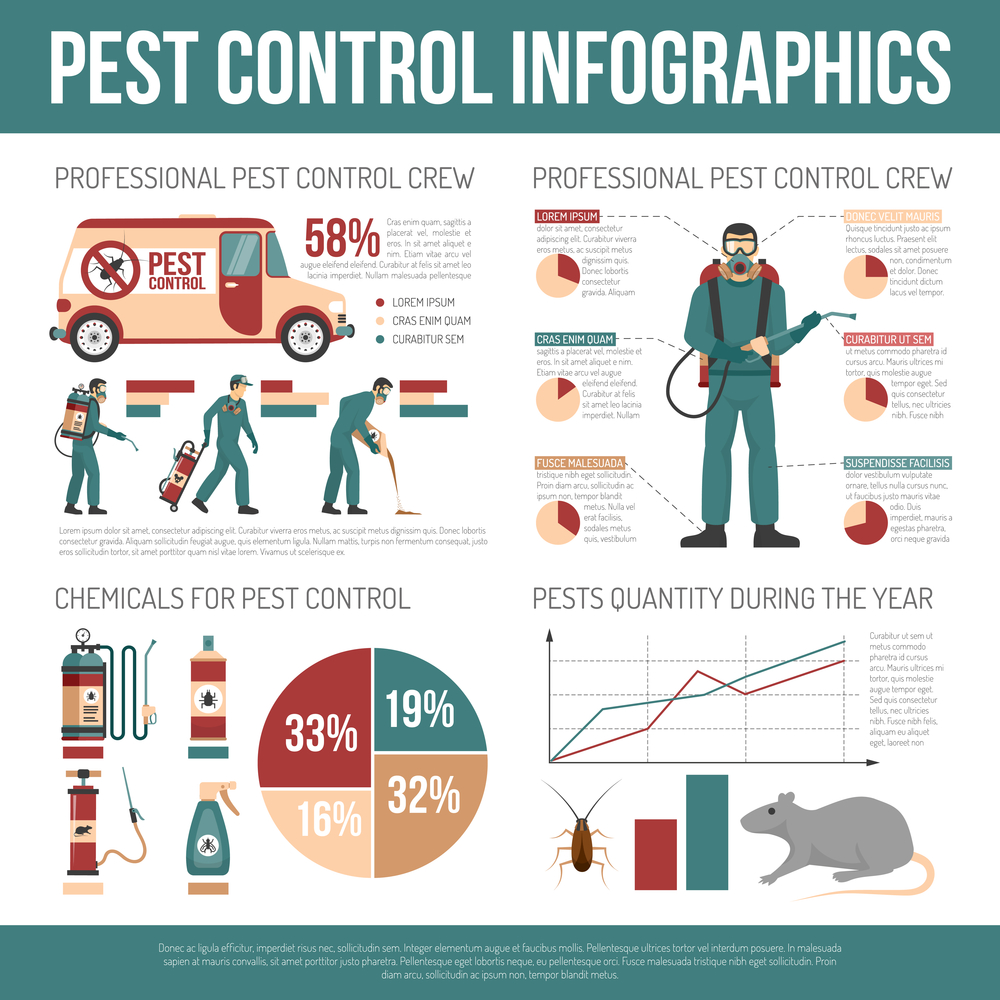5 Simple Techniques For Pest Control
5 Simple Techniques For Pest Control
Blog Article
Unknown Facts About Pest Control
Table of ContentsPest Control - An OverviewThe Pest Control PDFsPest Control Things To Know Before You BuyThe Greatest Guide To Pest ControlThe 10-Second Trick For Pest Control
Water (moisture) is taken into consideration a favorable problem that will certainly urge parasite invasions and can additionally result in inadequate air high quality inside. Get rid of tree and/or bush branches that are touching the exterior wall surfaces or roofing of a home because parasites, consisting of rodents and ants, typically use them to locate a way into the home (Figure 6).
Get rid of or frequently clearing water-holding containers that supply insect breeding sites. Evaluate the within your home and removing places where insects can hide and breed inside your home. Remove cardboard boxes and securing books and other paper products in plastic covered containers. Maintain food in sealed containers, including animal food.
Once a pest has been managed, it does not imply the job of pest control has ended. Parasite control need to be taken a part of regular home upkeep, specifically in states like Florida experience hefty parasite pressure. Frequently utilizing a preventative strategy to pest control using surveillance can conserve money and prevent damages to your home and the items stored within.
Grass and ornamentals (L&O). Airing out. Business are called for to have a certified driver in each of these categories if they are supplying these services. What is the "licensed driver?" The certified operator is a person who has actually met the state needs to exercise insect control (Pest Control). Certified drivers must pass a state assessment in a details group of bug control.
Unknown Facts About Pest Control
The state interpretation is an "individual holding an existing insect control driver's certification released by the division." (FS 482.021). Who is the "certified operator in-charge?" The licensed operator in-charge is accountable for the daily operations at the place of the pest control service. This person is accountable for choosing the methods and products made use of in servicing your home.
What are the needs to become a professional? After being worked with by a pest control firm, the licensed operator in-charge has up to 1 month to get an identification card for the brand-new professional with FDACS. Within six months of hire, the professional is needed to have at least 40 hours of documented training.
The various other hours remain in undefined subjects within the categories of general household bugs, termites and wood-destroying microorganisms (WDO), and lawn and decorative pest management. After the preliminary training, the specialist is needed to have two hours of training every year (Pest Control). Records needs to be kept by the firm and offered to FDACS for review upon request
The Basic Principles Of Pest Control
Here are several of the key benefits website link of this method: Single pest control services are developed to address a specific bug issue handy. It's perfect for those that are managing a single, separated infestation and desire a fast resolution. In most cases, an one-time solution is a lot more economical than a lasting pest control plan.
If you're dealing with a bug emergency situation, an one-time solution can offer instant relief. Pest Control. Pest control specialists will certainly act to eliminate the bugs instantly. There are no legal commitments or reoccuring payments connected with a single service. Once the insects are gone, the service is complete. A bug control plan, on the other hand, involves a continuous partnership with a parasite control supplier.
Below are the crucial features and benefits of bug control plans: Pest control prepares offer recurring, year-round protection versus a selection of bugs. They are ideal for home owners that wish to protect against infestations and keep a pest-free atmosphere. These plans generally include set up visits from specialist bug control professionals who examine, treat, and monitor your residential property throughout the year.
These check outs are generally arranged on a monthly, quarterly, or yearly basis, depending upon the plan. Parasite control strategies are proactive in nature. They aim to detect and attend to bug problems before they become full-on invasions. This can save you from handling much more substantial and pricey problems down the line.
The 6-Minute Rule for Pest Control
By spending in a parasite control strategy, homeowners acquire tranquility of mind, recognizing that their residential property is secured year-round. The selection between an one-time parasite control service and a parasite control plan mainly depends on your distinct situation.
If you're looking for long-lasting prevention and peace of mind, an insect control strategy is a smart investment. Think about visit their website factors such as the sort of insects you're managing, your location, your spending plan, and your long-term objectives for parasite monitoring. It's frequently a good idea to seek advice from with a reputable pest control business to discuss your options and receive professional assistance in making the best selection for your home.

Unknown Facts About Pest Control
The Home Guard Pro plan is a full-service option for bigger buildings beginning at 3,000 square feet., Ticks, Fleas, and Painful Bugs.
Similar to the get more other strategies, the Home Shield Total deals year-round protection from parasites, consists of interior and exterior inspections and therapies, and treatments for outside pests like mosquitoes, ticks, and fleas. It likewise quits termites from preying on and ruining your home!: Nuisance ants, Carpenter ants, Centipedes, Cockroaches, Earwigs, Millipedes, Computer Mice, Silverfish, Spiders, Fire Ants, Mosquitoes, Ticks, Fleas, and Painful Bugs PLUS Termites.
Report this page